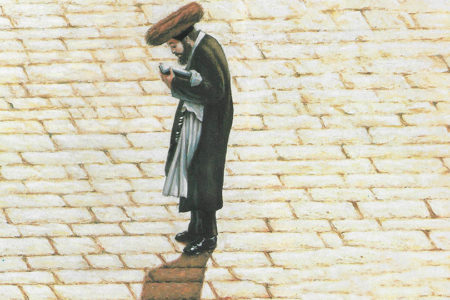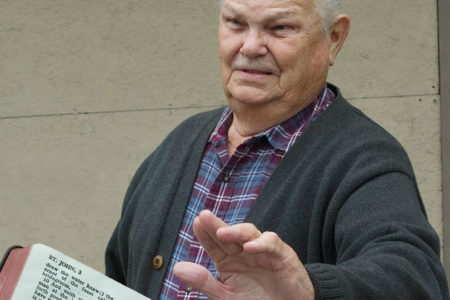Zvi Oct/Nov 1991
I recently noticed several posters in my neighborhood announcing that a famous rabbi would be speaking at our community center. I remembered this rabbi from many years ago when he was a popular television entertainer, but then he “repented” and is now lauded as one of the greatest rabbis of our time. His picture and quotes often appear in Israeli newspapers. When I saw these posters, I decided that I must see this great one in person, rather than on television, as I had done many years before.
It was announced that he would appear at 8 p.m., but he did not arrive until 9 p.m., which I did not consider to be a good beginning. There were more than three hundred people packed into a small auditorium waiting to see their hero, and I think I was the only one who did not have his head covered, as all good Jews feel they must do. When he did not arrive as scheduled, I asked some of the men around me why such a well-known rabbi could not keep his word, but they all defended him, saying that he was very busy and we must be patient. He finally arrived, and everyone stood up, applauding and cheering for him. When the commotion died down, he immediately started to speak, without so much as a “Shalom” to greet the crowd. And what did he speak about? The fictitious stories passed down from generation to generation—nothing new, just the same old fallacies he and many other rabbis continually relate. He concluded by saying that the most important thing a Jew can do is study the writings of our fathers, which, he stated, is even more important than having faith in God! Knowledge and the traditions of Judaism are all that count.
The three hundred people gathered in the auditorium were listening to this man as if he had been sent straight from Heaven. But I was troubled by what he said. Although I knew that the crowd would go against me if I spoke up, I had to say what was in my heart. I silently prayed, asking the Lord to give me courage, and then I rose to my feet and said to the rabbi “Please explain how knowledge can be more important than faith in God, when the Scriptures clearly tell us, ‘the just shall live by his faith’ (Hab. 2:4).” The rabbi seemed annoyed by my remark and replied, “I do not have time to answer you.” I, nevertheless, continued. “Do you and other great, learned, wise ones have some kind of an insurance policy to get you into Heaven? What about our father Abraham? He never went to a great university, but the Scriptures say, ‘he believed in the Lᴏʀᴅ; and he counted it to him for righteousness’ (Gen. 15:6). Are you now declaring that Abraham’s faith in God was of no value because he did not go to a great school and study all his life? Just look at what the great, learned people of our day have done with their knowledge. They have built atom bombs and stockpiled chemicals to kill people, and the nations of the world live in constant fear of these brilliant ones. I am sure that if such people were more concerned about faith in the Lord and loving Him as He loves us, they would do more good for the world than their great knowledge has accomplished thus far.”
By now the rabbi was very unhappy with me, because I had diverted the attention of the crowd away from him, and almost all of them were looking at me, waiting to hear what I would say next. The rabbi asked me to explain what I meant. In that instant, the Lᴏʀᴅ brought to my memory the reassuring words found in Luke 12:11–12, “when they bring you unto the synagogues, and unto magistrates, and powers, be not anxious how or what thing ye shall answer, or what ye shall say; For the Holy Spirit shall teach you in the same hour what ye ought to say.” He also brought to my remembrance that great chapter about faith, Hebrews 11, and I shared with the audience all the things our forefathers experienced because of their great faith in God. I told them, “It is written, ‘Now faith is the substance of things hoped for, the evidence of things not seen … But without faith it is impossible to please him’ (Heb. 11:1, 6).”
The rabbi was growing nervous. “All these people came here to see me,” he said. “The posters advertised my speech, and you have no right to take the spotlight away from me.” He was upset with good reason. All the people who had applauded and shouted, “We have come here to listen to our great rabbi” were now very quiet, waiting to hear his response to the things I had said. No one seemed inclined to make any trouble, which only added to the rabbi’s dilemma. You see, whenever he goes out to speak, he takes along several bodyguards to protect him, since his remarks often cause dissent in his audiences. But on this occasion, everyone was so quiet that even the bodyguards, who were there to see that not one hair of the rabbi’s head was harmed, were listening to me instead of their employer. This entire situation surprised me greatly, but of course I realized that it was the Lord’s doing.
The rabbi said, “Since you have changed this meeting into an open discussion, explain to us how you arrived at the strange position you hold.” I was grateful for this opportunity and said, “It is good to be wise, but wisdom without faith is useless, especially for a religious leader, such as yourself. How can you expect to bring others to faith in God when you do not consider faith to be as important as knowledge? In fact, why would you even want to encourage people to be faithful to God, if faith is not necessary? Now I want to ask the people in the audience a question. Who do you think is greater, the wisest professor who has no faith, or a man who has spent his life out in the desert, has never attended a school, but is faithful to the Lord? Which one of these two will be blessed by God?” Most of the people responded that the one from the desert—the uneducated man who was faithful to the Lord—was more important in God’s sight and would be blessed by Him. “You are correct,” I told them, “for it is written in Isaiah 40:3, ‘The voice of him that crieth in the wilderness, Prepare ye the way of the Lᴏʀᴅ, make straight in the desert a highway for our God.’ This voice did not come from Oxford University but from the Judean desert, and from there he cried to every heart in Israel, ‘Every valley shall be exalted, and every mountain and hill shall be made low; and the crooked shall be made straight, and the rough places plain; And the glory of the Lᴏʀᴅ shall be revealed’ (Isa. 40:4–5).”
The rabbi was now furious with me. He said, “I came here to speak for only one hour, and you have turned it into two hours. You have wasted my valuable time, and now I must leave!” And with that, he stomped off the stage.
He was obviously angry, but I was happy that these people had listened to me with such interest and patience. I would never have believed that such a thing could happen, but the Lord is able to do the impossible. Please pray for this large group, that the small seed planted that night will grow into a great, fruitful tree.








